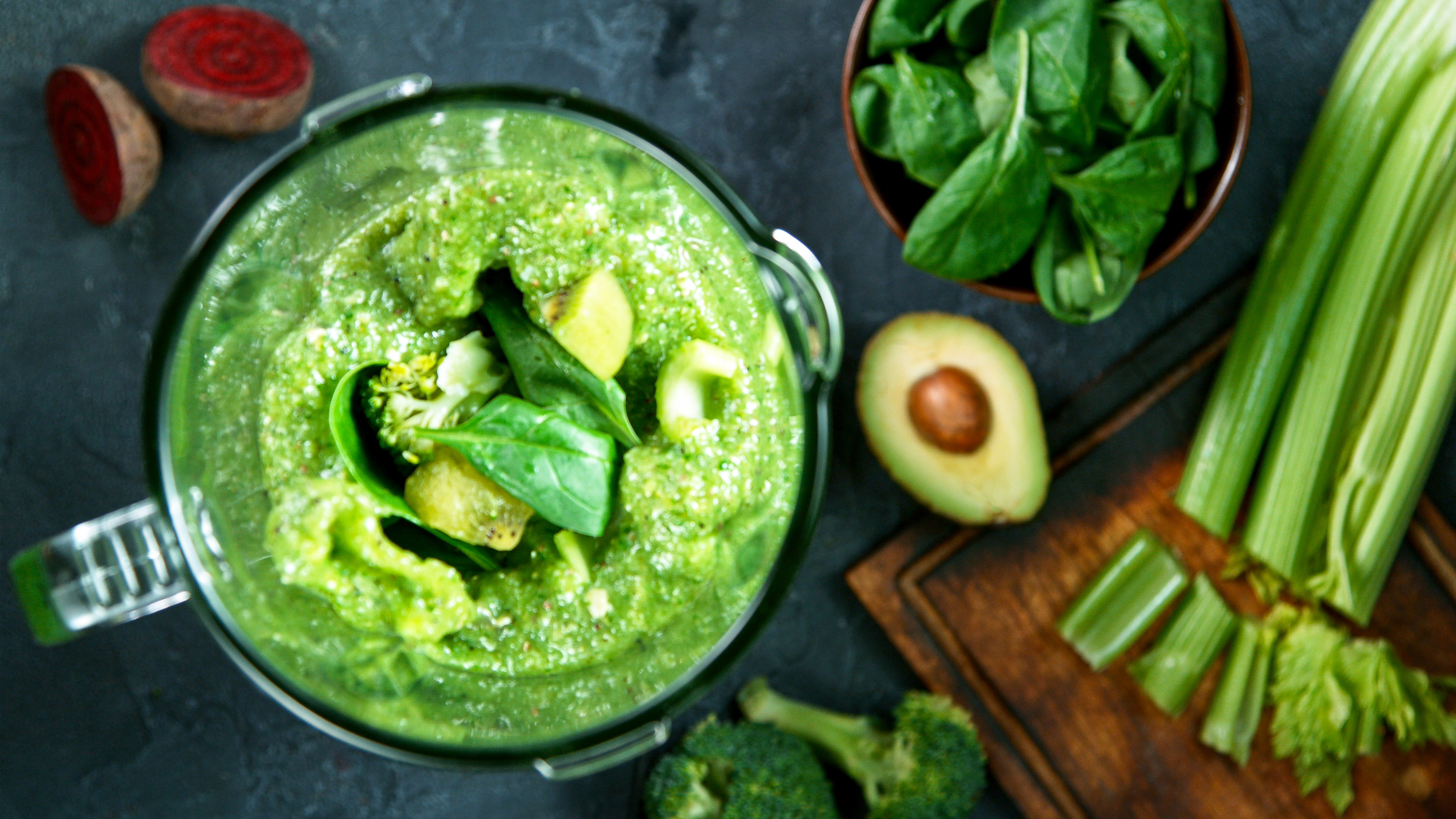The five best dishes to make in a blender and elevate your cooking
This kitchen appliance is often overlooked for so many dishes

Cooking the same meals every week can be a great way to save money, but can also lead to you getting bored easily. This is where one of the best blenders can come in handy - they can be used to create sauces, condiments, dips, cocktails and even desserts to bring new life to your dull dishes.
Before you write us off as crazy, hear us out. We know you could splash out on one of the best Instant Pots, which offers a multitude of cooking methods, or one of the best air fryers so you can create healthier versions of treats like fries and chicken wings with less oil that a deep fat fryer.
However, opting for a blender means you can make your own sauces and condiments such as hollandaise sauce, guacamole or mayonnaise, without much effort at all. You’ll be able to impress your friends and family, leaving them thinking you’ve morphed into a MasterChef contender. No longer will this kitchen appliance languish on your kitchen counter, only being used when you’re in the mood for a smoothie.
If you like the sound of this, then we’d recommend you opt for a jug blender. While they take up a lot of space on your countertop and can be expensive, they’ll be able to create a wide array of dishes. Personal blenders, which are also known as smoothie makers and are offered by brands like Ninja and Nutribullet, may seem attractive because they’re cheaper but they’ll struggle to successfully prepare items such as mayonnaise, because unlike with a jug blender you can’t remove a section of the lid and add ingredients during blending.
Want to get your hands on the best blenders now? Check out these great deals for some of the best on the market.
What can you make in a blender?
Blenders have grown in popularity over the last few years, according to research by the Association of Home Appliance Manufacturers homes with blenders use them an average of 6.3 times per month, which is an increase on the 4.4 times per month in 2009.
However, with a quarter of blender users admitting to making smoothies in them five times or more we’re clearly not getting the most out of them.
Get daily insight, inspiration and deals in your inbox
Sign up for breaking news, reviews, opinion, top tech deals, and more.
In need of some inspiration on putting your blender to good use? We’ve rounded up five of the best dishes you can make in a blender.
Sauces and dips
Whether you want hummus to dip crudites into, rich mayonnaise to enjoy with crisp fries or maybe even spread on a burger or guacamole for chips when you’re watching the big game, these and a range of other drip and condiments can be whipped up in under a minute in a blender.
Use the pulse function to ensure you can get them as smooth or as chunky as you’d like and if you’re making mayonnaise remember to add the oil in a steady fine stream through the removable section of the lid to ensure the ingredients emulsify, otherwise the mixture will curdle.
Inspired to make your own condiments? Watch this video on how to make mayonnaise or try our this recipe for guacamole
Nut butters
Peanut butter, hazelnut spread or even almond paste (often called Marzipan but you will need to add powdered or icing sugar and a dash of water) making nut butters with a blender is easy. Just add the nuts to your blenders, switch on to the highest power setting and wait - but be patient, it can take anywhere from 10 to 12 minutes for the fine powder created by the blades to form a creamy spread. Also consider roasting your nuts in the oven first, as warm nuts blend easier.
Check out this fail-safe recipe for peanut butter, which can be made in a blender as well as the food processor the recipe recommends. We also love Jamie Oliver’s version of homemade chocolate hazelnut spread, which one again can be made using a blender or a food processor.
Pancakes and waffles
Ok, technically you can make the batter for waffles, pancakes, crepes and for Brits, Yorkshire puddings for your sunday roast - in a blender. You’ll still need to cook the batter, whether that’s in a frying pan on a stove, using a waffle iron or for Yorkshire pudding - in a tin in the oven.
If all you can think about now is pancakes, then check out this recipe for banana bread pancakes. Alternatively, elevate your Sunday roast with these no-fail Yorkies.
Cocktails
Frozen margarita and daiquiris are impressive cocktails that will wow your guests, but thanks to a blender they can be made with very little effort. A word of warning though - not all blenders are powerful enough to crush ice, so check the instruction manual before adding ice to ensure you don’t find yourself shopping for a new blender. Start the blender on low and if possible use small chunks of ice to take the strain of the motor, also consider using frozen fruit rather than just ice cubes.
Get into the South American spirit and try this frozen caipirinha recipe.
Desserts
Chilled desserts such as sorbets and chocolate mousse are easy to whip up in a blender - and it’ll save the strain on your arms. If you’re making chilled desserts that contain raw eggs, don’t serve them to your children or pregnant women as they contain a risk of salmonella. In this case consider using avocado in your mousses (we’re not fans but you might well be).
Got a sweet craving to satisfy? This quick blender chocolate mousse recipe is simple and tasty. Alternatively, try Gordon Ramsey’s Chocolate Avocado Mousse recipe - if you’re feeling brave.
- Already taken the plunge? Then find out how to clean a blender
- Unsure which appliance to get? Find out in Juicers vs blenders
- Find out everything you need to know about how to use a blender
Can you crush ice and grind coffee beans in a blender?
As we’ve mentioned already, more powerful blenders from the likes of Vitamix, KitchenAid and Breville are capable of crushing ice but always consult the instruction manual before adding ice to your blender - particular if the pitcher is made of thin plastic which can crack under the force of spinning ice cubes.
To ensure as little strain on your blender as possible, allow ice cubes to rest on the counter for five minutes before adding to your blender, and add a small amount of water (this can be strained out after blending). Leave plenty of space for the ice to bounce around, and start off on the slowest setting, slowly increasing it over time. If possible, remove the lid during blending and redistribute the ice.
If your blender is powerful enough to crush ice and has a glass pitcher, then it should also be able to grind coffee beans too. Avoid using a blender with a plastic pitcher for grinding coffee beans as there’s a chance the smell could linger and the beans could scratch the plastic pitcher.
Just like when crushing ice, use small amounts - ¼ cup / 32g at a time, so the beans have room to move around and use a medium speed setting in small bursts to break them down - if you use the continuous blend function, the temperature inside the blender will increase and could start cooking the natural oils in the beans, which will result in a bitter flavor.
It’s worth noting using a blender will create a coarse grind that is best suited to drip coffee makers rather than espresso machines.
- Check out these great Nutribullet deals
Carrie-Ann Skinner was formerly Homes Editor at TechRadar, and has more than two decades of experience in both online and print journalism, with 13 years of that spent covering all-things tech. Carrie specializes in smart home devices such as smart plugs and smart lights, as well as large and small appliances including vacuum cleaners, air fryers, stand mixers, and coffee machines. Carrie is now a copy editor at PWC.
